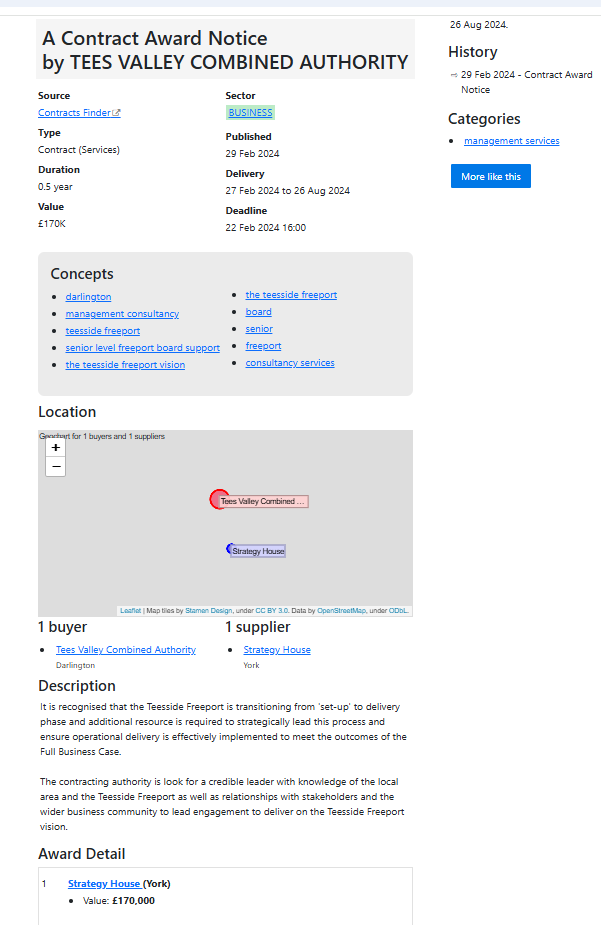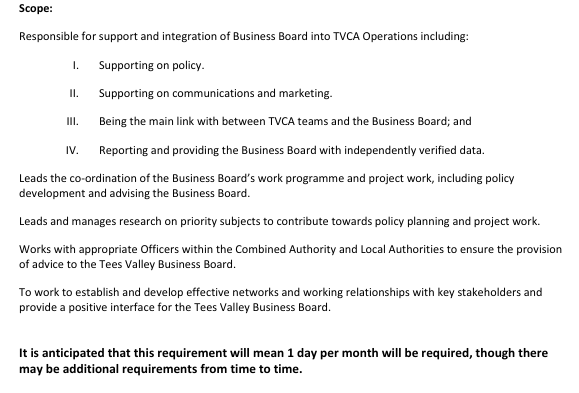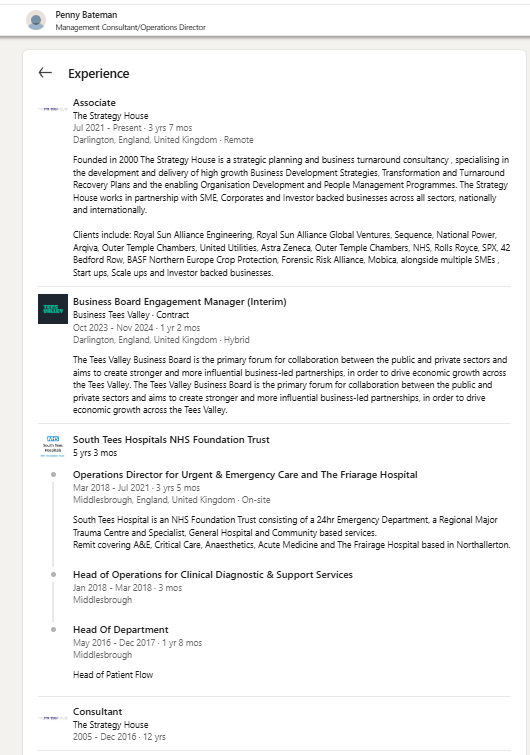Teesside Freeport
Welcomes
Its First Freeloader

6 February 2025
Text: Scott Hunter
Research: Victoria McCandless
When Michael Gove set up the Tees Valley Review into alleged corruption at Teesworks, he included a get out of jail free card for the mayor, Ben Houchen. It was entirely predictable that the inquiry would uncover significant failures of leadership and management at the Tees Valley Combined Authority, yet Houchen was among those who joined in the clamour for it to be conducted by the National Audit Office. Gove refused and set up an independent inquiry. In so doing he not only defied Labour MPs demanding an NAO inquiry, he also outwitted them.
As the FT reported in January, senior figures in government still want there to be an investigation by the NAO, but this would require Houchen’s consent. For his part, Houchen is now insisting that another inquiry would be a waste of public money, given one has already been conducted.
Houchen submitted plans for governance reforms at the TVCA in September last year, in response to the recommendations of the Tees Valley Review. The government is yet to respond. The Review, it appears, was at once damning and inconsequential.
In statements to the press, Houchen has remained bullish throughout, and evidence that has recently come to light indicates that questionable contracts continued to be negotiated even while the investigation was being carried out. One such involves the chair of the Tees Valley Business Board, management consultant and former CEO of South Tees Hospitals NHS Trust, Siobhan McArdle. A second involves her associate, Penny Bateman, also formerly of the Trust.
The McArdle Contract Part 1
On 29 February 2024, four weeks after the publication of the Tees Valley Review, the TVCA published a contract award notice:

Source: Bidstats
The Strategy House, established in 2002, is wholly owned by Siobhan McArdle. As she is chair of the Tees Valley Business Board, and a director of Teesside Freeport, the question arises as to whether she has used her position of influence to gain preferential access to this contract.
McArdle, the background
It was while she was CEO of South Tees NHS Trust that Siobhan McArdle became a member of the Tees Valley Local Enterprise Partnership (LEP). LEPs were at that time largely autonomous organisations made up of people mainly from the private sector whose remit was to promote economic growth. Once the TVCA was established, the Tees Valley LEP became an important advisory body to it. It has now been incorporated into the TVCA itself and renamed the Business Board.
McArdle resigned her position as South Tees CEO in 2019, but continued as LEP board member, becoming chair in 2021. This entitled her to membership of the TVCA cabinet. Towards the end 2021, when the Teesside Freeport was established, her position as chair of the Business Board entitled her to a seat on the freeport board as well.
Then, in February 2024, the TVCA decided that the freeport was now transitioning from ‘set up’ phase to ‘delivery phase’ and an appropriate organization/person was required to lead this process. A contract to the value of £170,000 was duly offered for tender, not publicly but by a process known as “competitive quotation”, where bidding is by invitation only.
[This is entirely proper. Contracts below a certain threshold are not subject to open tender, and this one, conveniently, falls just below that threshold.]
The TVCA has a chequered history in the matter of awarding contracts and was severely criticized in the Tees Valley Review for the generous terms of contracts awarded to Teesworks developers, Martin Corney and Chris Musgrave. In the McArdle case, there appears to be a conflict of interest. As director of her own company she works to maximise profit there, and as Freeport director she has a duty to ensure that the organisation obtains value for money from contractors.
We submitted a FOI request to the TVCA with a series of questions. The first was whether the TVCA perceived such a conflict of interest. Also, to ascertain whether or not proper procurement procedure had been followed when preparing the contract we asked if any other company had been invited to quote. Their answer to the first question was that she had declared her ownership of The Strategy House in in the TVCA Register of Members’ Interests. The answer to the second was ‘yes’. When we asked who the others invited to quote were, our request was refused. So, in reality, in neither case did we get the information we were looking for.
Manifestly, the Authority is very relaxed about its own members being awarded contracts, despite the issue that it may be seen as not offering a level playing field. We do not know if McArdle had a hand in the decision to invite her to tender, but the potential for lobbying clearly exists in the circumstances. (We also do not know whether the other parties invited to quote responded to the invitation). But who was making the decisions?
The FOI revealed that the decision to award the contract was taken by “[t]he Evaluation team which was made up of TVCA Directors”. It is not unreasonable to suppose that this team also decided on who should be invited to quote. As for who might be included in that ‘Evaluation team’, the TVCA website lists four directors – CEO, Julie Gilhespie; Group Director of Business and Skills, Helen Kemp; Director of Finance, Gary Macdonald; and Director of Infrastructure, Tom Bryant.
We do not know how many of the four made up the evaluation team. What we do know is that, of the four, Tom Bryant is a director of Teesside International Airport Ltd (TIAL), where the practice of directors of being awarded contracts is endemic. Bryant and Gilhespie are also directors of the airport holding company, Goosepool 2019, which effectively approves this practice. Gilhespie herself was criticised by the Tees Valley Review panel for holding directorships where there was a clear conflict of interest between her duty as director and her position as TVCA chief executive (most notably her directorship at Teesworks Ltd, which she did not resign until December 2024, eleven months after the Review was published).

Source: TIAL annual accounts, Companies House
But if all of this makes McArdle herself appear as little more than an innocent bystander here, there are a few circumstantial details that indicate that she is anything but. Firstly, there is the matter of a TVCA contract awarded to one Penny Bateman, and secondly, McArdle’s conduct while CEO of South Tees NHS Trust.
The Penny Bateman Contract
Penny Bateman is a sole trader who operates under the trading name Bateman Consultancy Services. In October 2023, she was awarded a 12-month contract with TVCA Business Board worth £75,000, Later extended by 4 weeks and revalued at £97,000 (Contract Ref No. DN696137). The role is to supply “ad hoc support to Business Board”.
Readers may be forgiven for thinking that this is a euphemism for ‘dogsbody’. But, if so, it’s very generously rewarded, not least the additional £22,000 at the end, just in time for Christmas. The specification for the job itself looks suspiciously secretarial. There is nothing wrong with that, but we can’t help thinking that and annual income of £75,000 is remarkably high for the sector. Note the surprising twist at the end of the contract specification:

Source: TVCA
£75,000 to provide ad hoc support one day a month. Great work if you can get it. As neither the Business Board does not control a budget, funding for this post, as with McArdle's, came from TVCA core costs.
And what relevant experience did Bateman bring to the role? For five years, until 2021, she was working for South Tees Hospital NHS Trust. By coincidence, or perhaps not, she arrived shortly after the appointment as Trust CEO of Siobhan McArdle. And, according to her Linked in profile, after quitting her job at the Trust in 2021, Bateman became an associate at The Strategy House, McArdle’s company, having held a similar position there between 2005 and 2016. So, McArdle and Bateman go back a long way:

Source: Linked in
While she describes herself as a consultant to The Strategy House over a period of twelve years, it is not immediately clear what she might have consulted on. Her Linked in profile shows that she completed two years of a three year degree course in Business Management at Kingston University, and under ‘Skills’ the first three listed are styling, fashion, and personal shopping.
This appears to have been sufficient for South Tees NHS Trust to appoint her as Head of Patient Flow in 2016, and to reward her with rapid promotion after that. However, the adventure ended badly both for her and for McArdle.
A Care Quality Commission inspection report in 2019 heavily criticised the Trust, and singled out Critical Care both at James Cook Hospital and the Friarage as being of particular concern. It is unclear whether Bateman was in overall charge of the operation, but she was certainly in a position of significant influence in that division of the hospital. Bateman carried on regardless until 2021, but McArdle resigned almost immediately, stating in her resignation letter that “the personal cost of being a CEO in the NHS is just too high and life is just too short." (BBC News)
Turmoil at the Trust
The deterioration in the quality of service at the Trust was rapid. The previous CQC inspection had shown no similar concerns to those expressed in 2019, four years after McArdle took office. And McArdle now appears remarkably shy about that period in her career. Her Linked in profile doesn’t mention it at all:

Source: Linked in
Her attempt to airbrush this from history may have something to do with some unflattering commentary on her performance at the Trust in a 2021 article in the Health Service Journal (paywall). The report begins
“Siobhan McArdle left South Tees Hospitals Foundation Trust with a bang in 2019, declaring “life is just too short” for the “very challenging financial and regulatory environment” she had to deal with.
“This was not the last we would hear about the management consultant turned NHS chief executive though, thanks to the generous pay and rewards package she managed to negotiate at the trust.”
The report goes on to catalogue payments to the ‘management consultant turned NHS chief executive’ of £53,000 for ‘overtime’, on top of her “already beefy” salary of £240,000 in 2019, followed by another £23,000 for the first half of 2020, “plus another £180,000 in lieu of her notice period, plus another £60,000 chucked in.”
It doesn’t end there. Information the journal obtained (with difficulty) through FOI revealed that she was actually contracted to work four days a week, making her pro rata salary £300,000. Her annual leave entitlement of 45 days per year was described by the Information Commissioner’s Office (ICO) as “considerably larger than what might normally be expected in a public sector role – even a senior one”.
The ICO “also noted the trust had previously been criticised by the Care Quality Commission for its “use of resources”, saying this “raises the question of whether the trust achieved value for money when it employed its former CEO – who is of course ultimately responsible for how the trust uses its resources”. Ouch.
It appears then that McArdle’s well-developed sense of entitlement has prompted her to milk the TVCA in much the same way. The TVCA itself appears to be willing to allow certain favoured people to dip into the honeypot, as we noted earlier.
The McArdle Contract Part 2
While the Care Quality Commission questioned whether the South Tees NHS Trust was getting value for money, the same question can be asked of the TVCA. Our FOI request included a question on what evaluation had been made of the work undertaken through the contract. Answer: none.
What little we do know about her work indicates that it appears to have involved a lot of travel, as she submitted mileage claims:


In the relevant period in 2024, McArdle is the only person whose name appears in TVCA published expenditure with a mileage claim. We note that that there is no indication of where she went. When she submitted a statement of work undertaken, there is no reference to travelling in it:

Source: TVCA
What is certain is that the powers that be at the TVCA felt the need for someone to undertake this role. The circumstances of that are, however, curious.
Creation of Teesside Freeport
The creation of Teesside Freeport was announced by the government in 2021. At that point a director, Nolan Gray, was appointed by the TVCA with the remit to set up the organisation. Gray, who had considerable experience in the ports sector remained until the spring of 2023, when he announced he was resigning. If there is a clear answer as to why Gray left, the Northern Echo and Teesside Live completely failed to grasp it and both outlets produced reports that raise more questions than they answer.
Essentially, Gray himself is reported to have said that there was no longer enough to occupy him, while TVCA CEO, Julie Gilhespie and the mayor claimed that he had become a very expensive ambassador for the freeport, and his day-to-day workload would be taken over by someone in a more junior position, while his ambassadorial role would be covered by members of Business Board. This put Teesside Freeport at odds with other freeports around the country, as all of these have retained a freeport director in post. So, did Gray resign because he’d had enough, or did the powers that be at the TVCA want him out? (The authority does have a record here. In 2021, their joint venture partner at the Teesside Airport, Stobart Aviation, departed without explanation (and were paid £1.5 million, apparently in compensation). That role was never filled with people with equivalent expertise).
Either way, the ambassadorial role was indeed taken over by a member of the Business Board, but at a cost. The contract with McArdle’s company was sealed the following February.
Gray was, at the point of his departure, belittled by Houchen and Gilhespie as ‘a very expensive ambassador’. Eight months later a 6-month contract is issued worth £170,000. That’s £340,000 pro rata. Was Gray more expensive than that?
Value for Money?
McArdle is issued a contract, and no evaluation is made of whether the Authority obtained value for money from it. (and similarly with the Bateman contract). The background to it is that a director with considerable sector experience leaves, and Houchen declares that, in essence, the job can be done much more cheaply. Except it can’t. And an expert in the field is then replaced with a management consultant (and a second contract has now been issued to a firm of management consultants based in Belfast).
The fact that the consultant in question has long experience of dipping into the public purse is almost coincidental. The fact that the TVCA repeatedly allows and even encourages people in senior roles to access contracts with it, on the other hand, is a matter of concern. The government will not act directly. The only available option is for the matter to be dealt with locally, difficult as that may be.
The TVCA has two statutory oversight bodies - the Oversight and Scrutiny Committee and the Audit and Governance Committee. These need to be much more assertive, and that needs to be supported by government. This report will be sent to the members of those committees with a request that they not only question representatives of the Authority about these contracts but also that they publish their own report on it. A couple of lines in the minutes will not suffice.
As for the government, there is the matter of the failure to properly investigate the TVCA on the one hand and the trumpeting of extended devolution on the other. The experience of the TVCA shows that oversight committees need to have extended powers to function like parliamentary committees, publishing their findings, and supported by the MHCLG. At present if the Authority refuses to answer questions from committee members, there is nothing they can do about it. This has to change.
Postscript
With the return of Trump and his entourage of billionaires, there has been much talk in the press about the US descending into oligarchy, and of the threat to democracy worldwide. We don’t dispute this in any way, but question only the idea that it has arrived along with the Trump bandwagon when, in fact, the conditions for oligarchy have been developing in the UK at a more local level for years.
Trump’s oligarchs will seek to enrich themselves with little regard for the public interest. In other words, the very idea of public service is alien to them. So it is with McArdle and others who hold senior positions in key public bodies, but use them to serve their own interests and those of their associates. McArdle is not alone in this, however. The practice is firmly established within the various bodies that make up the TVCA.
The government has previously investigated practices at Teesworks. But McArdle and Bateman are not closely involved with that part of the TVCA’s work. The Business Board has a wide remit. The upshot of this being that it is not simply in relation to Teesworks that the Authority’s commitment to delivering value for money is suspect.
If the government is accused of being feeble in its dealings with Houchen, the mud sticks. The plain fact is that, while the largest sums of money were disappearing into Teesworks, in other parts of the authority’s business, certain individuals have been able to negotiate very lucrative contracts. A government that is unwilling to countenance this fact and do something about it is wholly entitled to the criticism levelled against it.
As for us at Tees Valley Monitor, we believe a change of focus is in order. If no action is being taken at ministerial level, then pressure must be brought to bear locally. The TVCA has committees whose task it is to scrutinize aspects of the authority’s work. The Tees Valley Review criticized the authority for failing to provide these committees with adequate information or alternatively providing information at such short notice that members did not have time to examine it thoroughly in advance of meetings. While we welcomed the Tees Valley Review in general, we were concerned that it took it on trust that the members of these committees would have carried out their duties more robustly had they been kept properly informed. Now is an opportunity for them to demonstrate that commitment.
